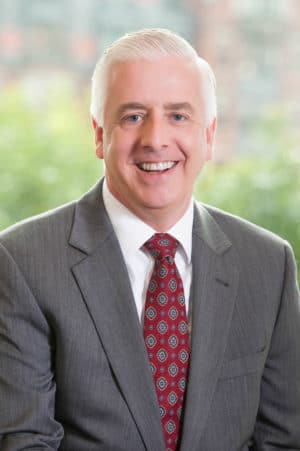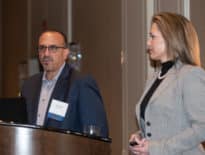Name: Darryl Fess
Title: President and CEO, Brookline Bank
Age: 56
Industry experience: 30 years
Darryl Fess came from humble beginnings, but now runs one of the largest community banks in Massachusetts. He grew up with four siblings in an apartment his parents rented for 20 years in Somerville. Because his father worked as an electrician at Boston University, Fess was afforded the opportunity to attend the school and became the first in his family to graduate from college.
From there, Fess started as a management trainee at Guaranty First Trust Co. in Waltham. He briefly dabbled in the tech sector before returning to banking as a collection supervisor for Blue Hill Federal Credit Union, which would eventually be acquired by Grove Bank.
When Citizens Bank later acquired Grove Bank, Fess left the company to work as a commercial lender for Wainwright Bank, where he spent the next 12 years. From there, Fess joined Brookline Bank and eventually rose to the top of the commercial real estate department before being promoted to president and CEO of Brookline Bank two years ago. Banker & Tradesman caught up with Fess to discuss current issues in the industry and the interest rate environment.
Q: In the current banking environment, what is the biggest issue that you face?
A: The main issue facing our industry today is the rising interest rate environment. As with all local community banks, we have had to react to the steady climb in short-term rates which, combined with stagnant long-term rates, puts pressure on the net interest margin, our primary source of income. Because we aren’t one of the too-big-to-fail, mass market banks, our ability to attract major corporate and institutional funds at low interest rates is limited. We also do not have the huge fee income that the mega banks have, such as from investment banking arms, so we have to live on the income we make from our core loan and deposit business.
Q: What lending group are you most bullish on now and in the future?
A: Brookline Bank is best known for our expertise in banking commercial real estate clients. We have made a significant investment to expand our commercial and industrial business by opening commercial banking offices in Braintree and Wakefield. We have hired experienced bankers in these markets to source and grow business relationships. These offices, located strategically in suburban business areas, allow our bankers to be close to their clients and to their families and avoid the commute to our headquarters in the Back Bay. Convenience for our customers and employees helps to support our goal of becoming the best commercial bank in Boston.
Q: I have heard Brookline Bank executives use the phrase “boutique style of commercial banking.” Can you elaborate on what this strategy means?
A: The bank has hired talented, experienced people, whose goal is to make things easy for our clients. Think about how you are treated at a boutique hotel as opposed to a national chain. There is someone to attend to your needs, give you advice about where to go or what to see. In similar fashion, our bankers use their years of experience to offer personalized service and guidance on matters of finance, structure and business operation. Our professional bankers are available to them at any time to discuss their needs and to work with them to achieve their goals.
Q: How has the bank used savings from tax reform?
A: Most of our tax savings have gone into people, tools and technology to help our bankers develop our products and services in a more efficient and seamless manner. Unfortunately, across the banking industry, many institutions use the tax relief to compete more aggressively on pricing by narrowing spreads without sacrifice to shareholder returns. We expect this race to the bottom to continue over a period of time but feel the strategy is short-term in nature. We are confident that our strategy of building relationships is long-term and supports our vision of a strong financial institution capable of supporting its customers in any economic climate.
Q: How does the bank deal with the continuing pressure that is making it hard to grow and retain deposits?
A: You just work harder. The bank has heightened training and awareness for all of our staff as to how best to strengthen our existing relationships and seek new, long-term customers. No local bank wants to build their base with non-relationship deposits, which narrows profit margin and doesn’t allow the opportunity to enhance the connection to our clients. Here again, we find focusing on service and personal attention is the only proven path to retaining existing clients and growing the business.
Fess’ Five Favorite Ways to Spend His Free Time:
- Traveling
- Spending time with family
- A sunny day on the beach
- Slow Sunday mornings with the newspaper
- A good documentary




 |
| 

